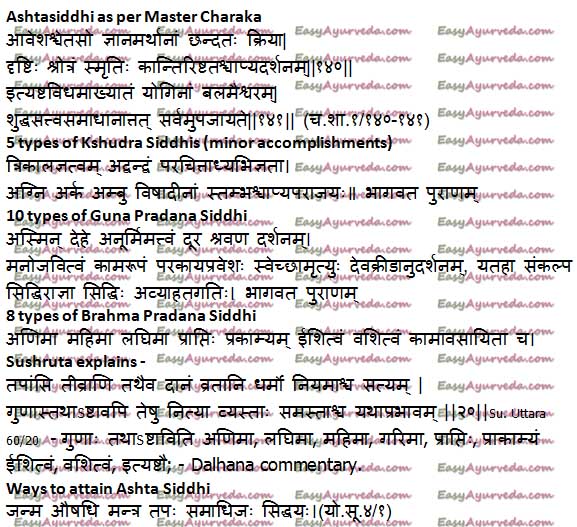Ashta Siddhi 8 Super Powers – Different Opinions
Article by Dr Raghuram Y.S. MD (Ay) & Dr Manasa, B.A.M.S
In Hanuman Chalisa – compilation of 40 divine hymns to worship Lord Hanuman , a verse describes Hanuman as ‘Ashta Siddhi Nava Nidhi Ke Daata’ which means Lord Hanuman is the granter of 8 super-powers and 9 divine treasures to those who worship him with dedication. In Hindu mythology, apart from Lord Ganesha, Lord Hanuman is said to adorn Ashta Siddhis and 9 treasures.
Table of Contents
Meaning, definition of Siddhi
Meanings of Siddhi
Siddhi, a Sanskrit term means
Accomplishments
Attainments
Success
Perfection
Definition (Wikipedia) – Siddhis are spiritual, paranormal, supernatural, magical powers, abilities and attainments that are the products of spiritual advancements through Sadhanas such as Yoga and Meditation. (Rddhi = psychic powers in Buddhism)

Ashta Siddhis
Ashta Siddhis as explained in Ayurveda
In Ayurveda too, Acharya Charaka has mentioned Ashta Siddhis which can be achieved by regular practice of Yoga.
Acharya Charaka tells that the Yogi attains 8 siddhis when he practices Yoga through the association of his shuddha satva (pure mind, devoid of raja and tama – which contaminate mind) and soul. 8 siddhis can be achieved only by those who practice Yoga by associating their pure mind with soul.
The Ashta Siddhis are
Aavesha – ability to enter into the other person’s body
Chetaso jnaanam – mind reading
Arthaanaam chandatah kriyaa – ability to control one’s sense objects according to will (perception of sense objects i.e. vision, sound, touch, taste and smell at will, as and when needed)
Drushtihi – ability to see the objects which are otherwise not perceivable by the eyes
Shrotram – ability to hear sounds even made at long distances and otherwise not audible
Smrutih – extraordinary memory
Kanti – extraordinary luster
Ishtatah adarshanam – ability to become invisible and visible at will
The Other Siddhis
We can find many types of Siddhis explained at various instances.
Yogis accept 23 types of Siddhis explained at various Indian scriptures. They may be briefly summed up as –
5 Kshudra Siddhis
5 types of Kshudra Siddhis (minor attainments) – From Bhagavata Purana
Trikalajnatvam – a precise knowledge of three time periods i.e. past, present and future
Advandvam – having good tolerance towards extreme dualities like hot and cold etc
Para chitta adi abhijnata – mind reading
Agni arka ambu visha aadeenaam pratistambhah – tolerating the effects of fire, heat of the Sun, water, poisons etc on self
Aparajayah – remaining undefeated by enemies
10 Guna Pradhana Siddhi
10 types of Guna Pradhana Siddhi (secondary attainments based on the predominant acquired quality) – From Bhagavata Purana
Anurmimattvam – Being undisturbed and unperturbed by bodily desires and wants like thirst, hunger etc
Doora Shravana – Ability to hear sounds coming from far away, which cannot be perceived by normal ears
Doora Darshanam – Ability to see the things which are placed far away, from the reach of vision (normal visual field),which cannot be seen by normal eyes
Manojavah – Ability to travel to any place wherever the thought goes (astral projection, teleportation)
Kaama Roopam – Ability to assume any form desired
Parakaya Pravesham – Ability to enter the body / bodies of other people
Svachanda Mrutyuh – Ability to die when one desires
Devanam saha krida anudarshanam – Witnessing and participating with the Gods in their sports, games, recreational activities and other pastimes
Yatha Sankalpa Samsiddhih – Ability to accomplish ones’ determinations, aspirations to perfection
Ajna apratihata gatih – Orders being unimpeded
8 Brahma Pradana Siddhi
8 types of Brahma Pradana Siddhi (Divine attainments, classical accomplishments)
Anima – Ability to reduce one’s own body to the minutest size and shape
Mahima – Ability to expand one’s own body to an infinitely large size
Garima – Ability to become infinitely heavy (develop heaviness to extreme levels in the body such that one cannot be moved). God Sri Rama bestowed this Siddhi on God Hanuman.
Laghima – Ability to become weightless (being light, able to float and fly). God Sri Rama bestowed this Siddhi on God Hanuman.
Prapti – Ability to be anywhere else at one’s will
Prakamya – Ability to obtain whatever one desires to have
Ishatva – Ability to have supremacy over the nature, ability to control and command nature
Vashitva – Ability to control another person, to make the person do things as per your wish.
As per Samkhya Karika
Ashta Siddhis explained in Samkhya Karika
The eight Siddhis explained by Acharya Kapila in the Tattvasamasa are as explained in Samkhya Karika. They are as follows –
Uuha – The attainment of knowledge about the 24 tattvas (entities involved in creation of the universe) gained by examining the prakriti and vikriti (determinable and the indeterminable conscious and the non-conscious constituents of creation), based on the samskaras of purva janma (qualities imbibed by the soul in the previous incarnation)
Shabda – Knowledge gained by associating self with an enlightened and learned person (Guru)
Addhyayan – Knowledge gained through study of the Vedas and other standard treatises
Suhrt Prapti – Knowledge gained from good and kind hearted friends (discussions, share of knowledge)
Daana – Knowledge gained regardless of one’s own needs, passive gain of knowledge (while being in the company of those seeking the knowledge or while attending to the requirements of those engaged in the search of ultimate truth)
Aadhyaatmika Dukha-haan – Freedom from pain, disappointment etc that may arise due to lack of spiritual, metaphysical and mystic knowledge and experience
Aadibhautik Dukkha-haan – Freedom from pain, disappointment, grief etc arising from being attached to or possessive about the materialistic gains and worldly pleasures
Aadidaivik Dukkha-haan – Freedom from grief, pain, disappointments etc caused by fate (ill-fate) or reliance on fate.
With the attainment of 8 Siddhis, one becomes free of the pain of ignorance, one gains knowledge and experiences ultimate bliss. This will also pave the pathway for salvation.
Reference in Sikhism
Mention resembling Ashta Siddhi in Sikhism
In Sikhism, Siddhi means ‘insight’.
According to Sikh Gurus, the Ashta Siddhis or 8 sorts of insight is used for the insight of the 8 qualities of Nirankar (the formless or God) mentioned in the Guru Granth Sahib, the religious scripture of Sikhism.
According to these scripts, God has eight qualities i.e.
Ek Oankar (Omkar) – There is only one God
Sat Naam – His name is true
Karta Purakh – He is the creator
Nirbhao – Without fear
Nirvair – Without Hate
Akaal Murat – Omnipresent
Ajooni – Free from birth and death
Svaibhang (Saibhan) – Self-Illuminating
The verse comprising of the above mentioned siddhis is called Mula Mantar
The one who has the insight of these qualities will be called and considered as Sidh or Gurumukhi (the attained or the accomplished)
Ways to attain Ashta Siddhi
Acharya Patanjali in his Yoga Sutra treatise mentions the ways (methods) of attaining the supernatural powers i.e. siddhis. Below mentioned are the ways of attaining Siddhi as per Patanjali –
Janma (by birth) – The children who are born to those parents who are spiritually high receive the powers of spirituality through birth owing to the womb they are born in and also as a part of genetic trait (predisposition). Alternatively it can be said that some people, by birth may have extraordinary powers to attain siddhi because of their attainments in their previous lives.
Aushadhi (medicine, herbs, drugs) – Miraculous and special powers (siddhi) can be attained by consuming some herbs and medicines.
Mantra (incantations) – Special powers can be attained by recitation (incantation) of mantras (sacred hymns which are powerful by nature). Such Mantras are found in Vedas.
Tapah (penance, self discipline) – The clouds of ignorance in the mind are warded off by following penance and self-discipline. With this, one will be able to control the 5 elements of nature as and when he wishes to do. It is possible by un-perverted thinking. This will help in attaining siddhi.
Samadhi (oneness with consciousness) – One is granted with extraordinary siddhi when he achieves oneness with consciousness.
Click to Consult Dr Raghuram Y.S. MD (Ayu) – Email / Skype









One comment
anish varshney
Excellent…..keep it up….!!